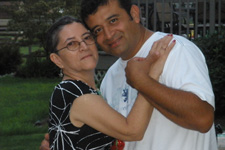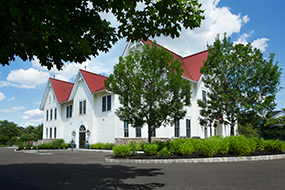Merida Recinos, a faithful mother and grandmother, was the center of her Guatemalan family. The youngest of 6, she kept her siblings, children, nieces and nephews, and grandchildren together throughout their lives as any true matriarch can. Her place in the family changed forever on January, 30, 2009.
At 8:00 am, 60-year-old Merida Recinos was visiting with her daughter and grandchildren. She left to take a bus to her job where, despite her Parkinson’s disease, she cleaned residential homes every day. As she was walking across Route 130 in Cinnaminson, New Jersey, a private bus turned left and hit her, knocking her unconscious. She suffered a massive blow to the left side of her head.
Merida’s daughter called her mother’s cell phone and when her mother didn’t answer, she knew something was wrong. A police officer finally called her back to report what had happened. The family met Merida at the hospital where they learned the devastating news: the blow to Merida’s head had caused serious brain damage. She needed emergency surgery to save her life.
The surgeon removed part of the skull to provide room for the brain to swell and heal. She remained an in-patient in the hospital for two months before she was released. After the accident, Merida required speech therapy, occupational therapy, and physical therapy. She also experienced extreme panic attacks, depression, and drastic personality changes.
“Before the accident my mother was a very independent person, somebody who took care of herself, my father, and took care of my kids – she used to babysit for me,” said Ruben, Merida’s adult son. “If I had a question or a problem or concern, she was the rock, the foundation bestowed in our family.”
“She liked to go on trips, she liked to go shopping, she was very active. She liked cooking and taking care of her grandchildren,” said Carmen, Merida’s adult daughter.
Due to the brain injury, Merida had no memory of the accident. Merida suffered what is now classified as a traumatic brain injury.
“Both sides [of the brain] right and left were injured. Both the right and left temporal lobes were injured and when that happens, you can expect that not only language but also memory are going to be affected,” said Dr. George Newman, a neurologist at Albert Einstein Medical Center who examined Merida one year after her accident.
Those who are close to Merida noticed that she “seemed not to learn.” She would shake her head yes in response to instructions but she would not react with understanding.
She completely lost her independence and must now rely on others for everyday life tasks.
“Because she cannot learn, because her judgment is impaired, because of the frontal lobe injury, because of her memory impairment, because of the bilateral temporal lobe injury, because she would not be able to reasonably be able to reach out for help or in some cases even know that she might need help, it would not be reasonable for her to be alone,” said Dr. Newman.
The bus driver claimed that Merida was crossing on a red light and had darted into the road. The police identified witnesses at the scene but none of the witnesses saw the actual impact, only its aftermath. It was the responsibility of Baratta, Russell, and Baratta to prove that the bus driver’s story was a lie and that Merida deserved compensation for her now extremely diminished quality of life. She cannot babysit anymore; she cannot drive or take the bus on her own. Where Merida used to be a completely independent woman, she is now one hundred percent reliant on the help of others to complete even the most mundane tasks.
“She’s almost like another kid in the family. We need to take care of her, we need to supervise her. We need to make sure she’s doing the right thing so that she doesn’t hurt herself,” said Ruben.
To the extent that she is aware of what is going on, she has a relatively moderate depression, because she cannot take care of herself or her family.
The thing that bothers her the most is that when she is in a family setting, she does not have the role that she used to have. “She used to be, in many ways, the matriarch of her large, extended family. She was used to that very prominent role,” said Dr. Newman. “She’s now deprived of that and when they talk at all it is about her, not really to her. They know that she has difficulty understanding. She becomes very frustrated as things have to be repeated. She has to be spoken to in a simplistic manner, which she detests. She knows that they are treating her like a child. But she knows that it is necessary and I think any of us could imagine how it would feel to be that way. As a result of that, she is very depressed. That specifically, that is what bothers her the most.”
The Baratta legal team started its task by re-interviewing witnesses to make sure their observations were all in agreement. From these interviews, the team determined exactly where the bus stopped after impact, where the pedestrian landed, what sounds were heard, what cars were moving and what cars were stopped at the moment of impact. After compiling all of this information, the Baratta team cross-examined the bus driver at deposition, committing him to explaining in minute detail exactly what happened, including the application of the bus’s brake, accelerator, the speed he was traveling and the gear he was in. The Baratta team then hired engineers to test the exact bus being driven to evaluate exactly how far it would have moved from its resting point to its stopped position, if one were to believe the bus driver’s story.
With all of the information obtained from witnesses, the driver and the engineer testing, the Baratta team hired an accident reconstruction specialist who, after thoroughly measuring all relevant distances in the intersection and timing all the signal sequences, was able to create a three-dimensional image of the intersection. Through this process the Baratta team was able to disprove, mathematically, the defendant bus driver’s story and to prove, in fact, how the accident must have occurred. The case settled for a confidential amount at Mediation.


